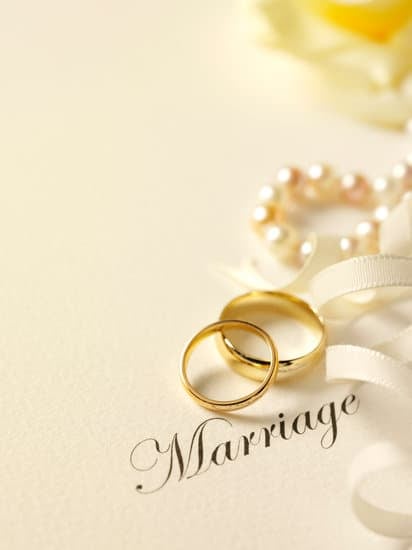Planning a wedding is a whirlwind of emotions, and finding the perfect wedding dress is often a top priority for many brides-to-be. However, what happens when the moment arrives and you don’t like your wedding dress? It can be a disheartening experience that brings about a wave of conflicting emotions. From disappointment to frustration, the journey of not liking your wedding dress can feel like an emotional rollercoaster.
The anticipation and excitement surrounding choosing a wedding dress can sometimes build up unrealistic expectations, leading to letdown if the reality doesn’t meet those ideals. In this article, we will delve into the complex emotions that come with not liking your wedding dress and explore various perspectives on this common bridal dilemma.
From understanding the root of the issue and seeking professional advice to exploring alternative options and finding the silver lining, we will navigate through the process of coping with disappointment and moving forward towards making peace with your decision. Whether it’s truly about the dress or something deeper, there are ways to manage these negative feelings while embracing the imperfections and enjoying your special day to its fullest potential.
Understanding the Root of the Issue
When you find yourself saying “I don’t like my wedding dress,” it can be a difficult and emotional experience. Understanding the root of the issue is crucial in addressing this dilemma. Here are some possible reasons why you might not be satisfied with your chosen gown:
- Unrealistic expectations: Maybe you had an idealized image of the perfect wedding dress, and your actual choice didn’t quite match up to that vision.
- Body image insecurities: It’s possible that certain features of the dress or how it fits make you feel self-conscious about your body.
- External pressure: You may have felt pressured by family members, friends, or societal standards to pick a dress that wasn’t truly reflective of your personal style and preferences.
Exploring these different perspectives can help you pinpoint the specific reasons behind your dissatisfaction with the wedding dress. Perhaps it’s not entirely about the dress itself, but rather a combination of internal and external factors contributing to your feelings.
Seeking professional advice is a positive step in addressing the issue. Consulting with a stylist or tailor can provide valuable insight and potential solutions. They may offer suggestions for alterations or modifications that could enhance the overall look and feel of the dress, alleviating some of your concerns.
Ultimately, understanding why you don’t like your wedding dress is essential in determining how to move forward. Whether it requires adjustments, a shift in mindset, or simply finding ways to embrace any imperfections, taking the time to analyze the root cause of your dissatisfaction can lead to a more positive resolution.
Exploring Different Perspectives
When you find yourself in the situation where you don’t like your wedding dress, it’s essential to take a step back and explore different perspectives. Sometimes, the feelings of dissatisfaction may not solely be about the dress itself, but rather something else that is causing these emotions. Here are some different perspectives to consider:
1. Personal Expectations: Reflect on your personal expectations and how they may be influencing your perception of the dress. Are you holding onto a particular vision or idea of how your wedding dress should look? Sometimes, letting go of preconceived notions can alleviate some of the disappointment.
2. External Influence: Consider if external opinions or pressures are impacting your feelings towards the dress. Whether it’s the input of family members, friends, or societal standards, outside influence can create added stress and dissatisfaction with your choice.
3. Emotional State: Take into account your emotional state leading up to selecting and trying on the dress. Stress, anxiety, or even body image issues can significantly affect how you perceive your wedding attire.
It’s important to remember that often, our reactions to situations come from a combination of factors rather than just one single issue. By exploring different perspectives, you may uncover underlying reasons for why you don’t like your wedding dress that extend beyond just its physical appearance.
Seeking Professional Advice
Considering a Second Opinion
If you don’t like your wedding dress, one of the first steps you can take is to seek professional advice from a stylist or tailor. A second opinion can provide valuable insights into whether the dress can be altered to better suit your preferences.
A stylist can assess the overall look and suggest potential changes, while a tailor can offer technical expertise on what alterations are feasible. Don’t hesitate to schedule appointments with multiple professionals to gather different perspectives before making any decisions.
Open Communication
When consulting with a stylist or tailor about your dissatisfaction with the wedding dress, it’s important to communicate openly about your concerns and desires. Be specific about what aspects of the dress you don’t like and express any anxieties you may have about making alterations.
This will help the professional understand your vision and work with you to find solutions that align with your preferences. Keep an open mind during these discussions, as they may lead to creative ideas for transforming the dress into something you love.
Exploring Alternatives
During these consultations, be open to exploring alternative options for modifying the dress. The stylist or tailor may propose innovative adjustments such as adding embellishments, changing the silhouette, or incorporating detachable elements that allow for versatility in wearing the dress. Through collaborative brainstorming, you may discover unexpected solutions that address your concerns and enhance the overall appeal of the gown. Ultimately, seeking professional advice can provide clarity and reassurance as you navigate through this challenging situation.
Alternative Options
When you have reached the point of not liking your wedding dress, it can be a distressing experience. However, there are alternative options that can potentially solve the issue and make you fall in love with your dress again. One possible solution is to consider altering or customizing the dress to better fit your style and preferences. Many brides find that this option allows them to transform their dress into their dream gown.
There are various ways in which a wedding dress can be altered or customized to better suit the bride’s vision. For example, a professional tailor can adjust the fit of the dress to ensure it flatters your body shape and provides the comfort you desire.
Additionally, alterations such as changing the neckline, adding embellishments, or adjusting the length can give your dress a completely new look. Customizations like adding sleeves or creating a unique design detail can also help make the dress feel more personalized and reflective of your individual style.
It’s important to keep in mind that altering or customizing a wedding dress often requires professional expertise. Consulting with an experienced seamstress or bridal stylist can provide valuable insights and recommendations on how to achieve the desired changes while preserving the integrity of the original design.
By exploring alteration and customization options, you may discover creative solutions that completely transform your wedding dress into a garment that you truly adore, allowing you to confidently walk down the aisle with renewed excitement.
| Possibilities for Alteration/Customization | Benefits |
|---|---|
| Adjusting fit, length, and neckline | Enhances comfort and flatters body shape |
| Adding embellishments or unique details | Gives dress a new look and adds personality |
| Consulting with professionals | Gain expert advice on preserving original design while making desired changes |
Coping With Disappointment
Dealing with the disappointment of not liking your wedding dress can be a challenging and emotional experience. It’s natural for brides to have high expectations for their special day, and when the dress they envisioned doesn’t live up to their hopes, it can lead to feelings of frustration and sadness.
The first step in coping with this disappointment is acknowledging and accepting these emotions. It’s okay to feel upset, but it’s important to find healthy ways to manage and process these negative feelings.
One approach that can help manage the negative emotions associated with not liking your wedding dress is seeking support from loved ones. Talking to friends or family members about your concerns can provide valuable perspective and reassurance. Additionally, engaging in self-care activities such as exercise, meditation, or hobbies can help alleviate stress and improve overall emotional well-being.
Another helpful strategy for managing disappointment is reframing your mindset. Instead of focusing on what you don’t like about the dress, try shifting your perspective to focus on what you do like about yourself. Remember that your beauty and confidence on your wedding day come from within, not from the dress you wear. Embracing this mindset can help shift the focus away from the negative aspects of the situation.
Finally, consider seeking professional guidance from a therapist or counselor if you find that managing the negative feelings associated with not liking your wedding dress is particularly challenging. A mental health professional can provide effective coping strategies and support to navigate through this difficult time.
| Strategy | Description |
|---|---|
| Seeking Support from Loved Ones | Talking to friends or family members about concerns for valuable perspective |
| Reframing Your Mindset | Focusing on what you do like about yourself instead of what you don’t like about the dress |
| Seeking Professional Guidance | Getting assistance from a therapist or counselor for effective coping strategies. |
Finding the Silver Lining
Accepting Imperfections
It’s perfectly normal to have mixed feelings about your wedding dress, but it’s essential to remember that perfection is subjective. Instead of focusing on the aspects you don’t like about the dress, try to shift your mindset towards embracing its unique features. Every dress has its own charm, and finding beauty in the imperfections can ultimately make you feel more confident on your special day.
Highlighting Positives
Instead of fixating on what you don’t like about your wedding dress, take some time to appreciate its positive attributes. Whether it’s the intricate lace detailing, elegant silhouette, or timeless design, there are bound to be elements that you do love about the dress. By shifting your focus to these aspects, you can start to see the beauty in your chosen attire.
Personalizing Your Look
If there are certain elements of the dress that you’re not completely satisfied with, consider adding personal touches to make it your own. This could involve accessorizing with a statement belt, embellishing with delicate beading or embroidery, or even incorporating a detachable train for added drama. Personalizing your look can help shift the focus away from any initial dissatisfaction and allow you to feel more connected to your wedding attire.
Remember that ultimately, what matters most is feeling confident and beautiful as you walk down the aisle. Embracing the imperfections of your wedding dress and making the most of it can lead to a memorable and joyous celebration of love.
Moving Forward
In conclusion, not liking your wedding dress can be a distressing experience for any bride-to-be. The emotional toll of feeling disappointed with such an important aspect of your special day can be overwhelming. However, it’s essential to remember that there are ways to address and overcome this issue, ensuring that you can move forward and enjoy your wedding day to the fullest.
Understanding the root of the issue is crucial in finding a resolution. Sometimes, the source of discontent with the dress may stem from underlying insecurities or pressures from societal expectations. By exploring different perspectives and delving into the true reasons behind your dissatisfaction, you may uncover that it’s not really about the dress itself.
Seeking professional advice from a stylist or tailor can provide much-needed guidance on potential alterations or customization options for the dress. This step can help transform it into something that aligns more with your vision, allowing you to feel more confident and comfortable on your big day.
Additionally, coping with disappointment and finding the silver lining in embracing imperfections will ultimately lead to making peace with your decision and fully enjoying your wedding day. Remember, the most important thing is to focus on celebrating love and commitment surrounded by loved ones, regardless of any wardrobe setbacks.
Frequently Asked Questions
Is It Normal to Not Like Your Wedding Dress?
It is not uncommon for some brides to not like their wedding dress. The pressure to find the “perfect” dress, coupled with high expectations, can sometimes lead to disappointment when reality doesn’t meet those expectations. Personal taste, body image issues, or simply changing trends can all contribute to not liking the chosen dress.
Is It Normal to Have Doubts About Your Wedding Dress?
Having doubts about your wedding dress is quite normal. With so many options available and the significance of the occasion, it’s understandable that some brides may second-guess their choice. Doubts could stem from concerns about how the dress looks, fits, or matches the overall theme of the wedding.
Do You Have to Love Your Wedding Dress?
While there might be societal pressure to love your wedding dress, it’s not a requirement. What matters most is feeling confident and comfortable on your special day.
If a bride doesn’t love her wedding dress, it’s important to remember that it’s just one aspect of the whole celebration. Ultimately, finding a dress that makes you feel comfortable and beautiful is more important than fulfilling any external expectations.

I have been involved in marriages for over 20 years helping couples and singles understand more about them.





